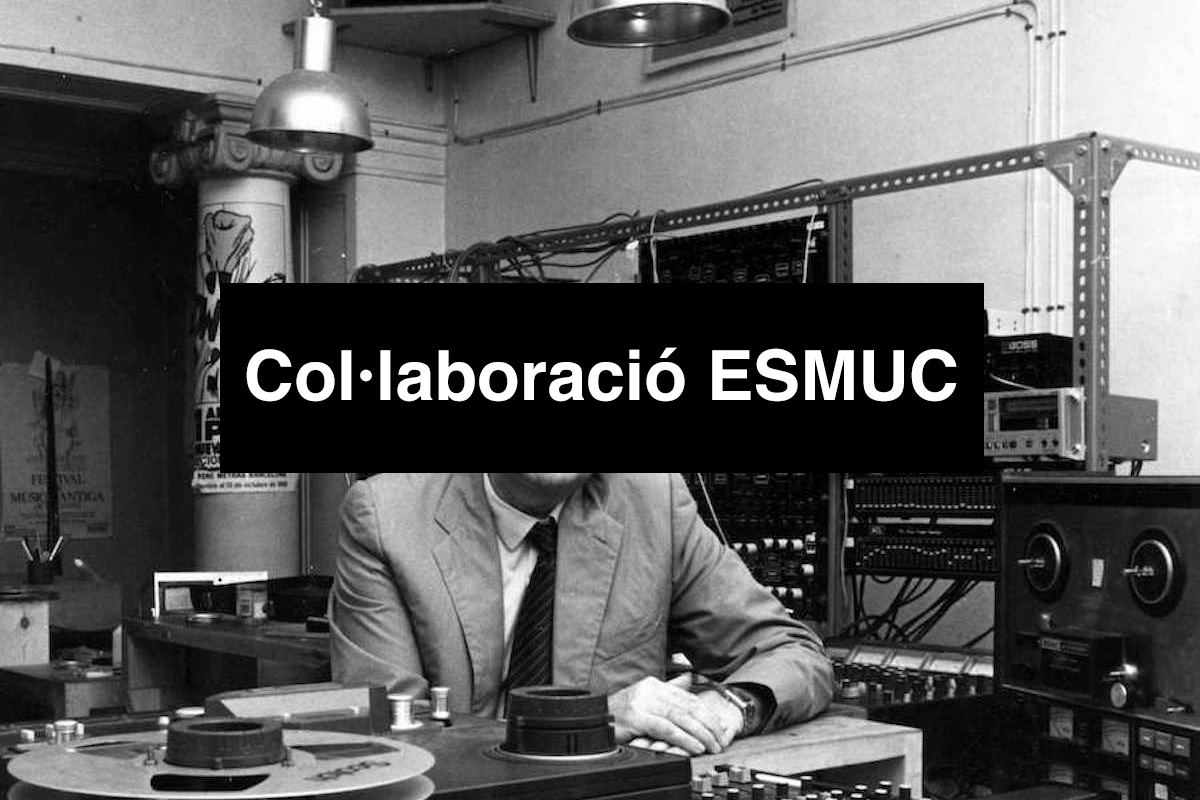Concert final del Màster de Composición amb Tecnologies de l'ESMUC
Concert final del Màster de Composición amb Tecnologies de l'ESMUC
Wednesday 30 September de 2020, 21:00h. Sala Aranyó (Campus UPF Poblenou)

This concert presents works for instrument and electronics by the first generation of students of the Master's Degree in Composition with Technology offered by the ESMUC. Works by Emili Bosch, Gabriel Saber, Andrés Arias and Byron Quimbita.
Programme
Andrés Arias: Recordix (2020) for violin [Erasmo Jiménez], native-american instruments (Sikus and Zumbador Guarani) [Andrés Arias] and electronics.
Byron Quimbita: Caminar (2020) for saxophone [Byron Quimbita] and electronics
Gabriel Saber: Deixe Veneza Afundar (2020) for violin [Eugen Casimov], cello [Angélica Guevara], harpsichord and electronics
Emili Bosch: you're noise (2020) for accordion [Elisa Sala] and electronics
Comments on the works by their authors
"Recordix comes from the Latin 'recordare', composed of the prefix re- (again) and cordis (heart), and evokes the ancient belief that the heart was the seat of memory, thus proposing an "other" listening. In the piece, native American instruments will be present, which will build the telluric and celestial space through which the violin will transit. Real time electronics will be a fundamental resource to complement the sound gesture, with the aim of offering the listener an experience of ritual sound travel. The piece ventures into a dialogue between two apparently opposing conceptual and sound worlds, but possibly complementary within the framework of musical language." (Andrés Arias)
"Caminar es una obra para saxofón y electrónica, pensado en captar todos los sonidos abstractos y naturales. Todo esto unido y mezclado con la electrónica nos da un resultado interesante y diferente, que solo con la electrónica se puede conseguir." (Byron Quimbita)
"Deixe Veneza Afundar/Let Venice Sink is a comment on the XXI century’s relationship with its history, art and culture. Venice - which in actuality is sinking - represents here the carcass of “western” “civilization” and how we, that were born and bred in the newest of ages, still hold in our grasp its past values, conventions and traditions as sacred - when in truth they are no more than human constructions. This piece proposes a new way, in which instead of numbinly echoing the voices of our too-much-glorified creators, we build upon their ruins to create anew. Deixe Veneza Afundar is inspired by these baroque ruins and degenerate them to build a message that is more fitting to our times: Venice is sinking. Let it. And, together, let’s make a new one.” (Gabriel Saber)
"you're noise is a study on what we understand by noise and its timbral possibilities. Everything is noise, everything is music." (Emili Bosch)

Bios
ANDRÉS ARIAS. Musician, composer and researcher, he began his musical studies at an early age at the conservatory of his home city, where he also began his violin training, studied Computer Engineering and later settled in the city of Buenos Aires where he studied a Master's Degree in Musical Creation, New Technologies and Traditional Arts at the Universidad Nacional de Tres de Febrero (UNTREF). He is currently completing his Master's Degree in Composition with Technologies at the Escuela Superior de Música de Catalunya. He has participated in different classical music groups, exploring genres such as tango, Argentine folklore, experimental music, among others. For the last few years he has been developing the Monoliro Project, in which he investigates the ancestral traditions of the world as the basis for musical composition, jointly incorporating movement and new technologies into his creative process, thus proposing interdisciplinarity within artistic development.
BYRON QUIMBITA attended several seminars with outstanding teachers such as Chris Potter (USA), Chick Corea (USA), Timothy McAllister (USA) Tomatito (Spain), Niño Josele (Spain), Carles Benavent (Spain) among others. He is currently studying a Master's degree in composition with technology and is participating in the Master's degree programme in Jazz and Modern Music, both at ESMUC.
GABRIEL SABER is a Spanish/Brazilian composer that started his musical education with private classes, soon to join the Conservatoire of Musica Popular Brasileira, where he studied singing and guitar. His passion for the creative aspects of art soon led him into numerous artistic independent projects, ranging from traditional choirs to theatre plays - where he worked often as both actor and composer. In 2018, Gabriel finished his education at Universidade Federal do Paraná in Music Composition, where he was in contact with the most prominent composers and music teachers of the region and, in the following year, his trajectory led him to Barcelona, where he started his master studies in electronic composition at Escola superior de música de Catalunya, a course that by the end of this year he will have finished.
EMILI BOSCH. After studying at Taller de Músics of Barcelona, he acceded to ESMUC to get the degree on Composition in which he receives lessons from Eduard Resina and Christophe Havel. He also attends to different composition seminars with Raphael Cendo, Clara Maïda and Bryn Harrison among others. He graduates in 2018 and after he does a Masters Degree on “Composition with Technologies” in which he receives lessons from Clarence Barlow and Ariadna Alsina among others. He has recently performed the work “Pills” for bass clarinet and live electronics released at Palau de la Música (within the Bienal de Ciència of Barcelona during February, 2019) or “Enzimologia” for 17 instruments performed at the Auditori of Barcelona (Sala 2, 2018). He is also the composer, producer and musician of the electronic duo B1N0 playing at Apolo (Barcelona), Sala BCN, BAM and being part of the line-up of the Sónar Festival 2020.
Master in Composition with Technologies
The anachronistic figure of the technical assistant who helped the composer generate and program the electro-acoustic part of his/her work has the same meaning today as if a composer needed an assistant to help him/her orchestrate because he/she was not able to do so. The composer is responsible for every sound element (electronic or instrumental) that makes up his/her work, and that is why new generations of composers who wish to use these means know how necessary it is for them to learn harmony, counterpoint or instrumentation, as well as to master concepts, techniques and programming for the generation and processing of sound, its sequencing and spatialisation, etc. New compositional techniques necessary to compose with current technology are now indispensable in the formation of new batches of composers and performers who wish to work on current repertoire with these media.
The Master's in Music Composition with Technology covers a wide range of technical aspects and specialised programmes, as well as concepts and techniques inherent in the creation and structuring of a well-crafted musical discourse, both from the perspective of instrumental writing and technology. Finally, the knowledge of this course converges in the elaboration of a mixed work for instrument and electronics in a free format that can go from an instrument with tape, to the work with interfaces and real time interaction.
in collaboration with
with kind support from:


